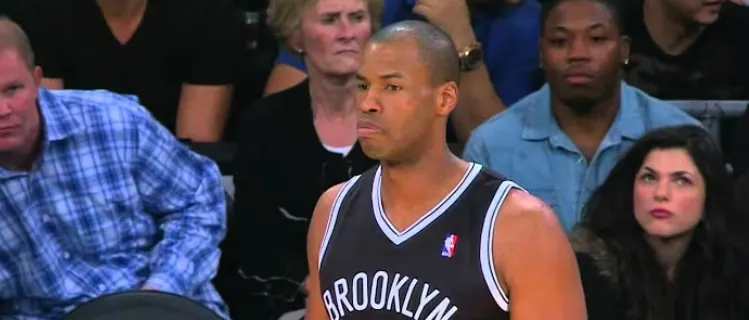1. The Announcement: A Quiet, Powerful Moment
On September 11, 2025, the basketball world and many beyond learned that Jason Collins, the former NBA center and prominent LGBTQ+ advocate, is undergoing treatment for a brain tumor, his family said in an official statement via the NBA.ESPN.com+3AP News+3AP News+3 The statement asked for privacy and prayers as Collins and his loved ones focus on his health and well-being.
- 1. The Announcement: A Quiet, Powerful Moment
- 2. Basketball Life: Numbers, Teams, and Court Highlights
- 3. Trailblazer On & Off Court
- 4. The Diagnosis: What We Know & Unknowns
- 5. Historical & Social Backdrop: Why This Resonates So Deeply
- 6. My Take: Strength, Uncertainty, and What Will Be Remembered
- 7. Broader Implications: Community, Health, and the Role of Sports
- 8. What to Watch Next
- Conclusion: More Than a Player, An Echoing Voice
This is not just a health update. It pulls back the curtain on human vulnerability, an accomplished athlete, an activist, a trailblazer, facing what many fear. It also reaffirms how public figures often balance privacy and public concern.
2. Basketball Life: Numbers, Teams, and Court Highlights
To understand Collins’ place in basketball history, you track both his stats and his journey.
-
Length of Career: 13 seasons in the NBA, from 2001 to 2014, playing for several teams: New Jersey/Brooklyn Nets, Memphis Grizzlies, Minnesota Timberwolves, Atlanta Hawks, Boston Celtics, Washington Wizards, and ending back with the Brooklyn Nets.
-
Draft & College: Drafted 18th overall in 2001 by the Houston Rockets, but traded on draft night to the New Jersey Nets. He played college basketball at Stanford.
-
Career averages: Over his NBA career, Collins averaged approximately 3.6 points and 3.7 rebounds per game. His best statistical season came in 2004-05 with the then-New Jersey Nets, when he posted about 6.4 points and 6.1 rebounds per game.Wikipedia+3ESPN.com+3AP News+3
-
Height & role: At 7 feet tall, Collins was primarily a center, often valued more for his defensive presence, screening, setting picks, altering shots, and providing veteran stability than for scoring.
Basketball is often measured in blocks, rebounds, and points, but leadership and presence don’t always show in box scores. Jason Collins embodied those less quantifiable traits.
3. Trailblazer On & Off Court
Collins’ significance stretches far beyond numbers. His actions and identity have shifted cultural conversations.
-
Breaking barriers: In 2013, while still an active player, Collins publicly came out as gay in a Sports Illustrated essay, becoming the first openly gay male athlete in one of North America’s four major men’s professional sports leagues.
-
Symbolic gesture Jersey No. 98: He chose number 98 with the Nets to honor Matthew Shepard, a young gay man who was murdered in 1998 in a hate crime. The jersey was among the top sellers, and Collins donated proceeds to relevant foundations.
-
Post-retirement role: After retiring in 2014, Collins has been active as an NBA Ambassador, working with league programs, social justice, and LGBTQ+ visibility.
-
Public recognition: He’s received various awards, featured in Time’s “100 Most Influential People in the World” (2014), and been honored for both sportsmanship and activism.
These choices coming out during his career, choosing a jersey to honor someone who suffered a hate crime, built a legacy that goes beyond the court.
4. The Diagnosis: What We Know & Unknowns
Collins’ family, via the NBA, shared some key pieces, but many remain private, as is common with medical cases of this nature.
What is known:
-
He is currently undergoing treatment for a brain tumor.
-
His family has asked for privacy and has welcomed support and prayers.
What is not known (publicly):
-
The type of tumor (benign vs malignant, location in the brain, etc.)
-
The stage, prognosis, treatment plan specifics (e.g., surgery, radiation, chemotherapy)
-
Expected recovery timeline or how this will affect his ongoing ambassador roles
-
Full details of symptoms, or when he first noticed them
These gaps are normal and understandable—medical privacy is important. Still, for fans and observers, the unknowns naturally raise concern, curiosity, and empathy.
5. Historical & Social Backdrop: Why This Resonates So Deeply
Jason Collins’ journey intersects with several broader currents: sports, identity, awareness, and representation. Knowing these helps explain why his diagnosis elicits such widespread reaction.
-
LGBTQ+ representation in sports: Collins’ entering the public as an openly gay active player stood at a crossroads of sports culture, social change, and bravery. In many pro sports, athletes often remain closeted because of stigma. His decision in 2013 helped shift norms and opened doors for conversations and for others to live more authentically.The Guardian+2The Times of India+2
-
Health & mortality of public figures: When someone with visibility faces a serious health issue, it humanizes broader discussions of wellness, mental health, medical access, and mortality. For former athletes, especially, whose bodies were once seen as strong and resilient, illness challenges narrative assumptions about invincibility.
-
Sporting legacy & identity beyond titles: Collins was not a superstar by statistical metrics. He never won an NBA Championship ring, but his legacy is built on more: consistency, solidarity, advocacy, and courage. That speaks to what many admire about sport beyond wins: character, impact, leadership.
6. My Take: Strength, Uncertainty, and What Will Be Remembered
In seeing the details, I find a mix of admiration, sorrow, and cautious hope.
Admiration: Collins has already lived a life that many would find too burdensome. To openly come out in 2013, while still in the league, and to continue to advocate for LGBTQ+ rights, those are brave steps that cost something. Now, in this fight, he deserves the same admiration for facing pain and uncertainty with dignity.
Uncertainty: The lack of public information about the type of tumor, treatment plan, and prognosis introduces a lot of unknowns. Medical cases vary widely. Brain tumors can differ in severity dramatically, from something manageable to very serious. All we have is his family’s statement and the basketball community’s support. The outcome isn’t predictable.
What will be remembered: When the dust settles, whatever happens, people likely won’t remember Collins mainly for points per game or rebounds. They’ll remember him for being the one who raised his hand, who wore No. 98 to honor someone else’s pain, who stood up for visibility in a sport that often shuns “difference.” These aren’t small things.
7. Broader Implications: Community, Health, and the Role of Sports
This story matters to more than basketball fans. It carries lessons and implications:
-
Mental health and public figures: Often, people in the spotlight feel they need to project strength. When they don’t, vulnerability becomes news. That dynamic needs compassion, not sensationalism.
-
Medical empathy & public awareness: Collins’ diagnosis may prompt more attention to brain tumors—in causes, detection, research, and support. When someone famous is affected, it often raises awareness in ways data alone seldom does.
-
LGBTQ+ advocacy continues: For many, Collins is not just a former player; he’s a symbol. His fight for health will be watched through many lenses: medical, cultural, and social. His LGBTQ+ community connections may see this as another moment in which people check in, express support, and mobilize.
-
Privacy vs public interest: Balancing respect for his family’s privacy with the public’s care for a person they admire is delicate. How media, fans, and institutions handle this may set precedents for how similar stories are treated.
8. What to Watch Next
Here are some of the developments that people (basketball fans, reporters, advocates) will likely monitor in the coming weeks/months:
Area |
What to look for |
Why it matters |
|---|---|---|
Medical updates |
Statements about diagnosis specificity, treatment plan, and progress |
Helps understand prognosis, clarifies severity |
Social reactions |
Messages from former teammates, other athletes, and LGBTQ+ organizations |
Provides emotional support and highlights the reach of his legacy |
Activism & legacy projects |
If Collins uses this moment to further awareness (e.g. fundraisers, advocacy) |
Could amplify impact beyond his own journey |
Role of the NBA & institutions |
How the NBA, Stanford, etc., respond (support, awareness campaigns) |
Sets the tone for how sports institutions address health among former athletes |
Fan & media approach |
Whether coverage stays respectful of privacy or becomes sensational |
Influences the broader culture of how we treat vulnerable public figures |
Conclusion: More Than a Player, An Echoing Voice
Jason Collins is confronting a serious health challenge. But his story remains one of courage on the court, off it, in how he lived openly, and in how he inspired others. While we do not yet know how this battle will unfold, what’s certain is that his legacy is already powerful.
In the end, maybe what we remember most isn’t about stat lines, or how many rebounds he collected, or which team won what. Perhaps what we’ll carry forward is how a man chose truth over fear, how he gave visibility to people who often feel unseen, how he stood up in a space where many voices get silenced.
In this moment, what we owe him is respect, prayer (or however people prefer to express support), and remembering what he’s already given a legacy beyond measure. May his fight be met with strength, love, and peace.





